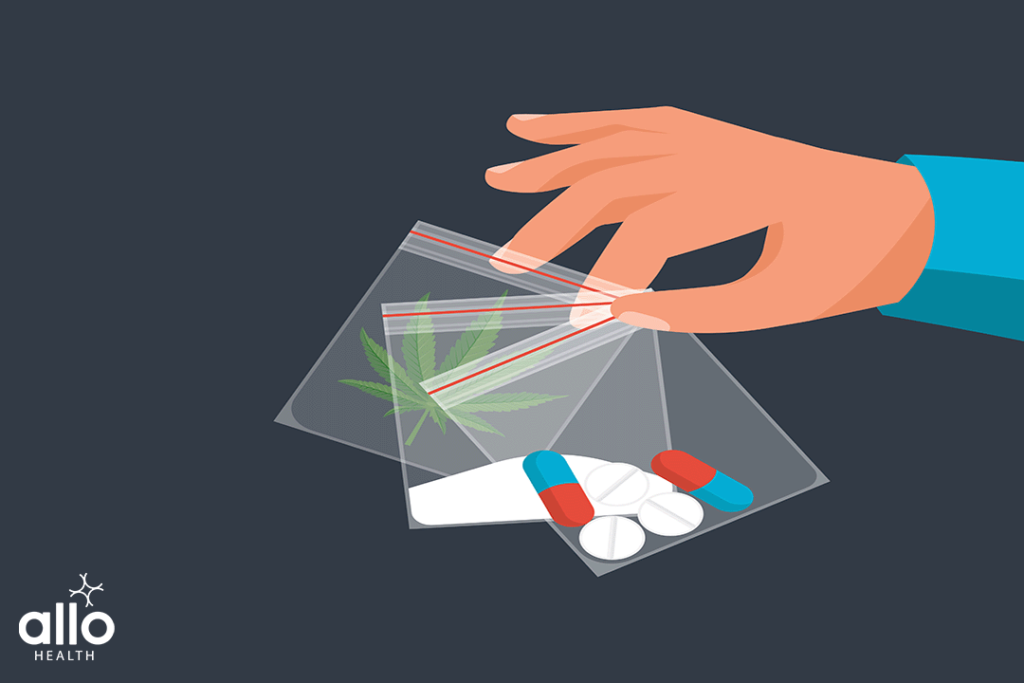Cannabis Addiction And Sexual Dysfunction

Allo Health is dedicated to personalized well-being, offering support and trusted information tailored to individual health goals. The platform emphasizes human-generated content, led by a distinguished medical team of experts, including physicians and sexual health specialists. Their commitment to credibility involves rigorous fact-checking, authoritative research, and continuous updates to ensure accurate, up-to-date information. Allo Health's unique approach goes beyond conventional platforms, providing expert-led insights and a continuous commitment to excellence, with user feedback playing a crucial role in shaping the platform's authoritative voice.

An early career psychiatrist with extensive experience in general adult psychiatry, relationship issues, psychosexual problems & special interest in sexual medicine, disorders with addictive behaviours and Obsessive Compulsive disorders. He is an astute physician with excellent academic record and research experience. He is also a member of World Health Organisation and World Psychiatric Association. His vision and goal for Allo is an inclusive, accessible digital health clinic for psychosexual difficulties.
Why This Was Upated?
Our experts continually monitor the health and wellness space, and we update our articles when new information became available.
Updated on 05 June, 2024
- Article was updated as part of our commitment to diversity, equity, and inclusion.

"The following blog article provides general information and insights on various topics. However, it is important to note that the information presented is not intended as professional advice in any specific field or area. The content of this blog is for general educational and informational purposes only.
Book consultation
The content should not be interpreted as endorsement, recommendation, or guarantee of any product, service, or information mentioned. Readers are solely responsible for the decisions and actions they take based on the information provided in this blog. It is essential to exercise individual judgment, critical thinking, and personal responsibility when applying or implementing any information or suggestions discussed in the blog."
What Is Cannabis?
Cannabis, also known as marijuana or weed, is a plant that is commonly used for its psychoactive effects. The plant is native to Central and South Asia and has been cultivated for thousands of years for its medicinal and recreational properties.
The main psychoactive component of cannabis is tetrahydrocannabinol (THC), which is responsible for the “high” that users experience. However, the plant also contains other compounds, such as cannabidiol (CBD), which has been found to have a number of therapeutic benefits.
Weed is used for a wide range of purposes, including as a recreational drug, as a medicine, and as a source of fiber and oil. In recent years, there has been a growing movement to legalize the use of cannabis for both medical and recreational purposes.
There are a number of different ways to consume weed, including smoking, vaporizing, and consuming edibles. Each method of consumption has its own unique set of benefits and drawbacks, and it is important to consider the effects of each method before choosing the one that is right for you.
Medical marijuana is used to treat a wide range of conditions, including chronic pain, multiple sclerosis, and cancer. It has been shown to be effective in reducing symptoms and improving the quality of life for many patients.
Despite the growing acceptance of cannabis, it is still illegal in many parts of the world and can have serious legal consequences for those who possess or use it. If you are considering using marijuana, it is important to be aware of the laws and regulations in your area and to use the drug responsibly.
Can Cannabis Addiction Cause Sexual Dysfunction?
While marijuana is often used recreationally, it is also commonly used for medical purposes. However, like any drug, marijuana can also have negative side effects, including addiction and sexual dysfunction.
Cannabis addiction is a real and serious condition that affects many people. It is characterized by a compulsive need to use the drug despite negative consequences. This can lead to concerns with relationships, work, and overall health.
One of the potential side effects of cannabis addiction is sexual dysfunction. Studies have shown that heavy marijuana use can lower libido, cause erectile dysfunction, and make it difficult for people to reach orgasm. This is thought to be due to the drug’s effects on the endocannabinoid system, which plays a role in regulating sexual function.
The exact mechanisms by which marijuana causes sexual dysfunction are not fully understood. However, it is known that the drug can affect the levels of certain hormones, such as testosterone and estrogen, which can lead to sexual dysfunction. Additionally, the drug’s effects on the brain may also play a role in causing sexual concerns.
Risk Factors
Cannabis, also known as marijuana or weed, is a popular recreational drug that is legal in some states and countries, but illegal in others. While it is generally considered to be less harmful than other drugs, such as alcohol and tobacco, there is still a risk of addiction associated with marijuana use.
Genetics
Studies have shown that genetics can play a significant role in the development of addiction. Individuals with a family history of addiction are more likely to develop an addiction to marijuana or other substances.
Age of first use
The earlier an individual starts using marijuana, the greater the risk of addiction. This is because the brain is still developing during adolescence and early adulthood, and cannabis use can disrupt this development and increase the risk of addiction.
Frequency of use
The more frequently an individual uses marijuana, the greater the risk of addiction. This is because the brain becomes accustomed to the drug and requires more of it to achieve the same effects.
Method of use
Smoking or vaporizing cannabis can increase the risk of addiction, as it results in a faster onset of effects and a stronger “high”.
Co-occurring mental health disorder
Individuals with mental health disorders such as anxiety, depression, or PTSD are more likely to develop an addiction to cannabis. This is because they may use marijuana as a way to self-medicate and relieve symptoms of their mental health disorder.
Stress
People under high levels of stress may turn to cannabis as a way to cope with their stress and relax. Over time, cannabis use can become more frequent and lead to addiction.
How Does Cannabis Affect The Body?
Cannabis, also known as marijuana or weed, is a plant that has been used for its medicinal and recreational properties for centuries. The active ingredients in cannabis, known as cannabinoids, interact with the body’s endocannabinoid system, which plays a role in regulating various bodily functions.
When marijuana is consumed, the most well-known cannabinoid, tetrahydrocannabinol (THC), binds to receptors in the brain and central nervous system, resulting in the “high” or euphoria associated with marijuana use. THC also has analgesic (pain-relieving) properties, which is why it is often used to treat chronic pain and other conditions such as multiple sclerosis and cancer.
Cannabidiol (CBD) is another major cannabinoid found in cannabis. Unlike THC, CBD does not produce a high and has been shown to have anti-inflammatory, anti-anxiety, and anti-seizure properties. CBD is often used to treat conditions such as anxiety, depression, and PTSD.
Cannabis use can also affect other bodily systems. For example, it can increase heart rate and blood pressure, which may be dangerous for people with heart conditions. Long-term use has also been linked to respiratory concerns, such as bronchitis and lung infections. Additionally, smoking or vaporizing cannabis can release harmful chemicals that may lead to cancer.
Sexual Disorders
One of the lesser-known effects of cannabis addiction is the potential for sexual dysfunction, including a reduced libido, difficulty achieving and maintaining an erection, and difficulty reaching orgasm.
Marijuana affects the body’s endocannabinoid system, which plays a role in regulating sexual function. The psychoactive component of cannabis, tetrahydrocannabinol (THC), has been shown to disrupt the balance of hormones that play a role in sexual function, leading to decreased libido and other sexual disorders. Additionally, cannabis use can lead to anxiety, depression, and other mental health concerns, which can also negatively impact sexual function.
One of the most common sexual disorders associated with cannabis addiction is erectile dysfunction (ED). Studies have shown that men who use cannabis regularly have a higher risk of ED, and that the risk increases with the frequency and duration of use. Marijuana use can also lead to decreased sperm count and mobility, which can affect fertility.
Women who use cannabis may also experience sexual disorders, including decreased libido and difficulty achieving orgasm. Cannabis use can disrupt the balance of hormones, leading to changes in menstrual cycle and other physical symptoms. Some studies have also suggested that cannabis use may increase the risk of cervical cancer in women.
Mental Health Disorders
Depression
Studies have shown that regular Marijuana use can increase the risk of developing depression, particularly in individuals who have a predisposition to the condition. Cannabis can also worsen symptoms in those who already have depression
Anxiety
It can cause feelings of paranoia and panic, which can lead to long-term anxiety disorders. It can also make existing anxiety disorders worse.
Memory Loss
An addiction can also lead to cognitive disorders such as memory loss and attention deficits. These disorders can have a significant impact on a person’s ability to function in their daily life, including at school or work.
Psychosis
An addiction can also lead to psychosis, which is a severe mental health disorder characterized by hallucinations, delusions, and disordered thinking. Individuals with a family history of psychosis or other mental health disorders are at a higher risk of developing psychosis as a result of cannabis addiction.
It’s important to note that not everyone who uses cannabis will develop a mental health disorder, but the risk increases with prolonged and excessive use. If you or a loved one is struggling with cannabis addiction, it’s important to seek professional help. Treatment options include therapy, counseling, and support groups, which can help individuals manage their addiction and reduce their risk of developing mental health disorders.
Major Organs & Systems Negatively Affected
Cannabis addiction can negatively affect several major organs and systems in the body, including:
- The lungs: It’s smoke contains many of the same harmful chemicals found in tobacco smoke, which can lead to lung irritation and respiratory concerns such as chronic bronchitis.
- The brain: Use can lead to addiction, and heavy use has been linked to mental health concerns such as anxiety, depression, and psychosis.
- The heart: Increase heart rate, which can be a concern for people with heart conditions.
- The immune system: Weaken the immune system, making a person more susceptible to infection.
- The reproductive system: Reduce sperm count in men and disrupt ovulation in women.
Most Asked Questions
-
What is cannabis addiction?
Cannabis addiction, also known as marijuana addiction or marijuana use disorder, is a condition in which an individual has difficulty stopping or reducing their use of marijuana despite negative consequences.
-
What are the symptoms of cannabis addiction?
Symptoms of cannabis addiction can include tolerance (needing more marijuana to achieve the desired effect), withdrawal symptoms (such as irritability, insomnia, and loss of appetite) when not using marijuana, difficulty controlling use, and continuing to use despite negative consequences.
-
What causes cannabis addiction?
The exact cause of cannabis addiction is not known, but it is thought to be related to the way that marijuana affects the brain. The active ingredient in marijuana, THC, affects the brain's reward system, leading to feelings of pleasure and euphoria. Over time, this can lead to addiction.
-
How is cannabis addiction treated?
Treatment for cannabis addiction typically includes therapy, support groups, and in some cases, medication. Behavioral therapies such as cognitive-behavioral therapy and motivational enhancement therapy can help individuals identify triggers for marijuana use and learn strategies for coping with cravings. Support groups such as Marijuana Anonymous can provide additional support and encouragement. In some cases, medication such as dronabinol (Marinol) or nabilone (Cesamet) may be used to help manage withdrawal symptoms.
-
Is cannabis addiction real?
Yes, cannabis addiction is real. Studies have shown that long-term marijuana use can lead to addiction in some individuals. According to the National Institute on Drug Abuse (NIDA), about 9% of people who use marijuana will become addicted to it.
-
Can cannabis addiction be prevented?
While it may not be possible to completely prevent cannabis addiction, there are steps that can be taken to reduce the risk. These include delaying the age of first use, using marijuana in moderation, and avoiding high-potency marijuana.
-
Does cannabis addiction affect blood flow?
Cannabis contains chemicals known as cannabinoids, which interact with the body's endocannabinoid system. One of the main cannabinoids in cannabis is tetrahydrocannabinol (THC), which is responsible for the drug's psychoactive effects. When THC enters the bloodstream, it binds to cannabinoid receptors in the brain and other parts of the body, leading to changes in mood, perception, and other cognitive processes. One of the ways that cannabis can affect blood flow is by dilating blood vessels, which leads to a decrease in blood pressure. This can cause lightheadedness and dizziness, especially in individuals who are not used to the drug. In some cases, this can also lead to an increased risk of heart attack or stroke, particularly in older adults or those with pre-existing cardiovascular conditions. Studies have found that heavy cannabis use is associated with an increased risk of deep vein thrombosis (DVT), a condition in which blood clots form in the legs. This can lead to serious complications, such as pulmonary embolism, which occurs when a clot travels to the lungs. Moreover, chronic weed use may also lead to addiction which is characterized by compulsive drug-seeking behavior and difficulty in stopping despite the negative consequences. Individuals who are addicted to Marijuana may find it difficult to stop using the drug, even if they are experiencing negative effects on their physical or mental health. This can lead to a range of concerns, including an increased risk of heart disease, stroke, and other health concerns.
-
Does cannabis reduce sexual desire?
Marijuana can have different effects on sexual desire depending on the individual and the amount consumed. Some studies have suggested that weed use may increase sexual desire and pleasure, while others have found that it can decrease sexual desire and performance. Additionally, heavy cannabis use can affect the hormonal balance in the body and lead to decreased sexual desire. Amotivational syndrome is a condition that is often associated with chronic cannabis use. This syndrome is characterized by a general lack of motivation, apathy, and a decreased interest in normal daily activities. While there is still much research to be done in this area, it is believed that chronic cannabis use may be a contributing factor to this condition. The symptoms of amotivational syndrome can be quite debilitating, making it difficult for those who suffer from it to maintain regular activities, relationships, or even hold down a job. Symptoms may include a lack of interest in previously enjoyed activities, low energy, difficulty concentrating, and apathy towards important responsibilities. While some may argue that amotivational syndrome is simply a myth, research suggests otherwise. One study found that chronic cannabis users were more likely to experience apathy and a lack of motivation compared to those who did not use cannabis. However, it is important to note that not all cannabis users will experience this syndrome, and other factors such as depression, anxiety, or other underlying conditions may also be contributing factors.
-
So, how does cannabis use contribute to amotivational syndrome?
It is believed that the psychoactive compound in cannabis, tetrahydrocannabinol (THC), may be responsible. THC interacts with the brain’s reward system, releasing dopamine which is responsible for the feelings of pleasure and motivation. Chronic cannabis use can lead to a desensitization of this reward system, leading to a decrease in motivation and an overall lack of interest in life. However, it is important to note that not all cannabis use will result in amotivational syndrome. The frequency, amount, and method of cannabis use can all play a role. Additionally, other factors such as age, mental health, and overall lifestyle habits may also contribute. For those who are struggling with amotivational syndrome, it is important to seek support from a healthcare professional. While reducing or quitting cannabis use may be helpful, it may not be enough to reverse the symptoms of amotivational syndrome. Therapy, counseling, and other forms of treatment may be necessary to address the underlying issues and help individuals regain their motivation and interest in life.
-
What is medical marijuana?
Medical marijuana refers to the use of the cannabis plant or its derivatives, such as CBD oil, for the treatment of various medical conditions. These conditions include chronic pain, anxiety, depression, and cancer-related symptoms such as nausea and vomiting. Medical marijuana is legal in many states in the US, and in some countries around the world, with a prescription from a licensed healthcare professional. The active ingredient in medical marijuana is a chemical called cannabidiol (CBD). Unlike the psychoactive compound tetrahydrocannabinol (THC), CBD does not produce a "high" or euphoric effect. Instead, it has been shown to have anti-inflammatory, analgesic, and anxiolytic properties, making it a useful treatment option for a wide range of conditions. Medical marijuana can be consumed in various forms, including smoking, vaporizing, tinctures, and edibles. It is important to note that the dosage and form of medical marijuana will vary depending on the individual and their condition. It is always recommended to consult with a healthcare professional before starting any treatment with medical marijuana. Medical marijuana has shown promise in treating certain conditions, more research is needed to fully understand its potential benefits and risks. Additionally, as with any medication, there may be side effects associated with the use of medical marijuana, and it may not be appropriate or effective for everyone.
-
What does cannabis do to blood glucose levels?
Cannabis, also known as marijuana, is a plant that contains compounds called cannabinoids. These compounds can affect the body in various ways, including impacting blood glucose levels. Research has shown that weed can have different effects on blood glucose depending on the dose and method of consumption. Short-term effects of marijuana use can include a temporary increase in blood glucose levels. This is because THC, a cannabinoid found in cannabis, can stimulate the release of insulin from the pancreas, which can lead to a temporary increase in blood glucose. However, long-term use of cannabis may have the opposite effect and lower blood glucose levels. This is because THC and other cannabinoids can increase insulin sensitivity and improve glucose metabolism in the body. Studies have also suggested that regular use of cannabis can lead to a decrease in fasting glucose levels and improved glucose tolerance. More research is needed to fully understand the effects of cannabis on blood glucose levels, and the results of studies so far have been mixed. Additionally, it's important to consider that smoking or vaporizing weed can have negative effects on lung health and can lead to other health concerns. It is also worth noting that marijuana can interact with blood sugar medications, so people with diabetes should talk to their doctor before using marijuana.












































